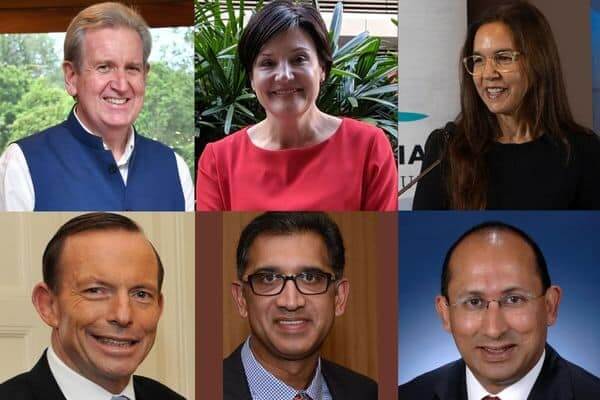There is no bigger power game in town right now than the contest for the Chair of the soon-to-be-launched Centre for Australia-India Relations.
The Centre was announced earlier this year as part of the India Australia Economic Cooperation and Trade Agreement (Ind-Aus ECTA), which is expected to increase bilateral trade from the current $27 billion to $45-50 billion in five years.
The Department of Foreign Affairs and Trade (DFAT) describe the Centre – allocated a budget of $21.4 million – as a national platform bringing together all levels of government, industry and the broader community to drive Australia-India engagement. It will complement existing institutions and function as the centre of gravity for the bilateral relationship, according to DFAT.
According to a spokesperson from DFAT, the Centre’s Establishment Taskforce has held public consultations across Australia and in India, speaking to over 250 individuals and receiving over 60 public submissions.
It is expected that the Centre and its Chair will have access to the highest levels of government on both sides, as the two nations strive to take their relationship closer economically, politically, and socially.
Australia’s Indian community will be called upon to support broader bilateral engagement with their country of origin.
There is much interest and speculation about who will get to Chair the high-profile Centre when it launches next year.
The position represents prestige, clout, and unprecedented access to the highest levels of decision making. Perhaps more importantly, it affords an opportunity to shape the future of the two countries at a time of economic disruption (as Australia continues to look at markets other than China) and geopolitical uncertainty (as India and Australia get closer under the blanket of the Quad to counter the threat of an expansionist China.)
While DFAT is playing their cards close to their chest as to who is in the shortlist for Chair, we’ve compiled our own list of possible frontrunners, based on current involvement in bilateral relations and relationship with the diaspora.
- Lisa Singh A former Labor Senator, Ms Singh has been heading the Australia India Institute based at Melbourne University since late 2021. While she has been a strong advocate in promoting a deeper conversation between the two countries, she has had to endure questions about the true role of AII in her tenure: is it a thinktank based on academic endeavour (as originally intentioned), or does it also have economic and political agenda?
- Jodi McKay Former Leader of the Opposition in New South Wales and Labor leader, Ms McKay is closely connected to the Indian diaspora in Australia, especially Sydney. While her new role as the Chair of the Australia India Business Council (AIBC) is recent, there is a new energy at the organisation, and it will be good to see real benefits accrue in the near future.
- Peter Varghese As the brain behind the holy grail of Australia’s changed perspective towards India (in the much-lauded India Economic Strategy to 2035), a former High Commissioner to India, and a person of Indian heritage, Mr Varghese can bring experience, vision, in-depth knowledge and wisdom to this important role in its inaugural version.
- Barry O Farrell Former Premier of NSW and current High Commissioner to India, Mr O’Farrell finishes his tenure in Jan 2023. Whether he is keen to throw his hat in the ring is anybody’s guess, but his contemporary knowledge of India and his experience as a politician will come in handy at CAIR, and make him a very capable Chair.
- Tony Abbott The former Prime Minister has strong political connections with India; his rapport with PM Modi and Commerce Minister Piyush Goyal (who he has anointed as the man most likely to succeed PM Modi) is well known. He has been a special envoy to India and is credited with progressing the much-acclaimed ECTA. Having worked at the highest levels of government he understands the dynamics of decision making and could well be an asset in a role such as Chair of CAIR.
- Harish Rao The Melbourne-based head of the Australia India Chamber of Commerce, Mr Rao is a soft-spoken businessperson who has worked in the Australia-India sphere for a considerable time and would bring in valuable corporate intel and experience.
Foreign Minister Penny Wong is probably also finalising membership of the Advisory Board currently, to guide the activities of the Centre.
While a formal launch date has not yet been announced for CAIR, DFAT confirms it will be in the first half of 2023.
India’s Prime Minister Narendra Modi is expected to make his second visit to Australia in Feb 2023 for a Quad meeting and to further wean Australia away from China.
It will be a perfect opportunity to inaugurate the new Centre then.




